Related Research Articles

The Royal Society of Chemistry (RSC) is a learned society and professional association in the United Kingdom with the goal of "advancing the chemical sciences". It was formed in 1980 from the amalgamation of the Chemical Society, the Royal Institute of Chemistry, the Faraday Society, and the Society for Analytical Chemistry with a new Royal Charter and the dual role of learned society and professional body. At its inception, the Society had a combined membership of 34,000 in the UK and a further 8,000 abroad.
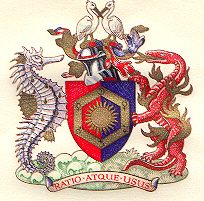
The Royal Institute of Chemistry was a British scientific organisation. Founded in 1877 as the Institute of Chemistry of Great Britain and Ireland (ICGBI), its role was to focus on qualifications and the professional status of chemists, and its aim was to ensure that consulting and analytical chemists were properly trained and qualified.
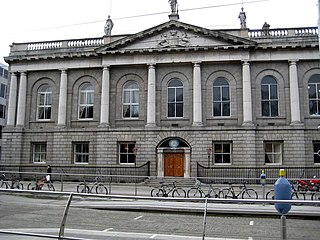
The Royal College of Surgeons in Ireland (RCSI) is a not-for-profit medical professional and educational institution, which is also known as RCSI University of Medicine and Health Sciences. It was established in 1784 as the national body for the surgical branch of medicine in Ireland, with a role in supervision of training, and as of 2021 provides a broad range of medical education in multiple countries.
David H. Dolphin, is a Canadian biochemist.

Narayan S. Hosmane is an Indian-born cancer research scientist who made the featured article in NRI Achievers magazine and is currently distinguished research professor of Chemistry and Biochemistry. He received the Humboldt Research Award for senior scientists twice. This award is presented annually to scientists worldwide as a tribute to their lifelong accomplishments by Alexander von Humboldt Foundation, Bonn, Germany.
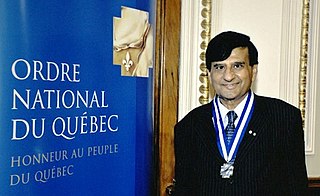
Ashok K. Vijh, is an Indian born Canadian chemist. He was born in Punjab but moved to Canada in 1962.
Graham John Hutchings CBE FRS FIChemE FRSC FLSW is a British chemist, Professor for Research at Cardiff University.
Charles Kemball CBE PRSE FRS FRSC FRIC was a Scottish chemist who served as president of the Royal Society of Edinburgh (1988–91) and as president of the Royal Institute of Chemistry (1974-6). He pioneered the use of mass spectrometry. and was a leading expert in heterogeneous catalysis.
Oluwole Babafemi Familoni is a professor of Chemistry at the University of Lagos and member of the Governing Council of the Institute of Chartered Chemists of Nigeria. Between 2000 and 2002, he was the Sub-Dean of the Faculty of Science of the University of Lagos. He was appointed the Head of the Department of Chemistry between 2002 and 2005. He later became the dean of science between 2008 and 2012. He is a fellow of the Nigerian Academy of Science, elected into the academy's fellowship at its Annual General Meeting held in January 2015. He is currently the Deputy Vice-Chancellor of University of Lagos. Professor Familoni is the International Representative for Royal Society of Chemistry, London for Southern Nigeria.

The Department of Chemical Engineering, Imperial College London is the centre of teaching and research in chemical and process engineering at Imperial College London, occupying the Aeronautics and Chemical Engineering Extension (ACEX), Bone and Roderic Hill buildings, on the South Kensington campus. Formally inaugurated in 1912, the department has over 40 faculty members, 100 postdoctoral researchers, 200 PhD researchers, 80 taught postgraduates, and 500 undergraduates. The department ranks 7th on QS's 2018 world rankings.
Sadhan Basu FNA, FASc, FRSC was an Indian physical chemist, academic and the Palit Professor of Chemistry at the University of Calcutta from 1964 to 1985. He was known for his elucidation of the Quantum Mechanical Model of Robert S. Mulliken. His article, Degree of Polymerization and Chain Transfer in Methyl Methacrylate, co-authored with Jyotirindra Nath Sen and Santi R. Palit was the first published Indian article on polymer chemistry. He was an elected fellow of the Royal Society of Chemistry, Chemical Society of France, Indian Chemical Society, Indian National Science Academy and the Indian Academy of Sciences. The Council of Scientific and Industrial Research, the apex agency of the Government of India for scientific research, awarded him the Shanti Swarup Bhatnagar Prize for Science and Technology, one of the highest Indian science awards, in 1962, for his contributions to chemical sciences.
Elizabeth Anne Howlett Hall CBE, CChem, FRSC is a British Professor of Analytical Biotechnology at the Institute of Biotechnology, Department of Chemical Engineering and Biotechnology at the University of Cambridge.
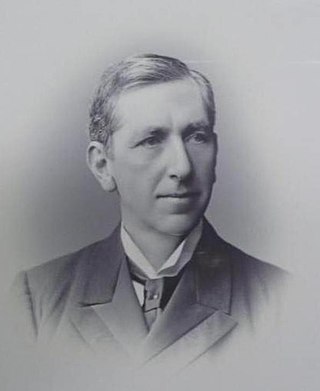
Professor Edmund Albert Letts FRSE FCS FIC was a 19th-century English chemist. He was a pioneer of analytical chemistry. The Letts Nitrile Synthesis is named after him. He spent much time analysing the content of carbon dioxide in air and water and the latter part of his life looked at pollution in tidal waters. Queens University Belfast give a Letts Chemical Research Scholarship in his memory.

Robert Mark Wightman is an electrochemist and professor emeritus of chemistry at the University of North Carolina at Chapel Hill. He is best known for his work in the areas of ultramicroelectrodes, electrochemistry, and neurochemistry. One of Wightman's most notable achievements is the development of the ultramicroelectrode and microelectrode voltammetry. At the same time as Wightman's innovations, the microelectrode was developed independently by Martin Fleischmann at the University of Southampton. In 2011, Wightman had the 192nd highest h-index, 74, of any living chemist. As of 2018, Wightman was an author of over 390 papers and had an h-index of 103.
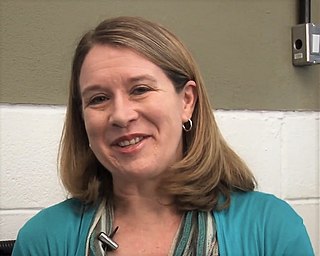
Christy Lynn Haynes is a chemist at the University of Minnesota. She works at the interface of analytical, biological, and nanomaterials chemistry.
Thomas Edwin Nevin was an Irish physicist and academic who had a distinguished career in the field of molecular spectroscopy. He was Professor of Experimental Physics and Dean of the Faculty of Science in University College Dublin from 1963 to 1979.
Apryll Marie Stalcup is an American chemist who is Professor and was the Director of the Irish Separation Science Cluster at Dublin City University. She was awarded the 2021 Chromatography Forum of the Delaware Valley Stephen Dal Nogare Award, the 2015 American Microchemical Society Benedetti Pichler Award and named in the 2016 Power List of the Top 50 Women Analytical Scientists worldwide. Her research considers surface-confined ionic liquids and chiral separations.
Paul William Bohn is an American chemist who researches molecular nanotechnology. He is a fellow of the American Association for the Advancement of Science, Royal Society of Chemistry, and Society for Applied Spectroscopy, as well as a co-editor of the Annual Review of Analytical Chemistry.
Joseph Thomas Hupp is an American chemist. He is the Morrison Professor of Chemistry in the Weinberg College of Arts and Sciences at Northwestern University.
References
- ↑ "Reports from IUPAC-Sponsored Symposia". Chemistry International. January 2000. Retrieved 21 November 2010.
- ↑ "Members list". Royal Irish Academy. Archived from the original on 18 November 2011. Retrieved 21 November 2010.